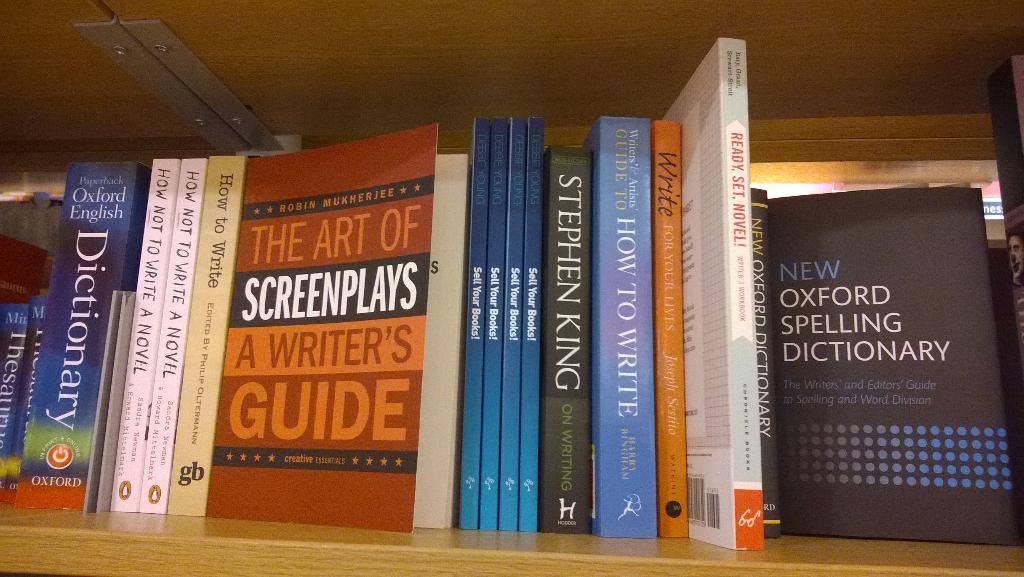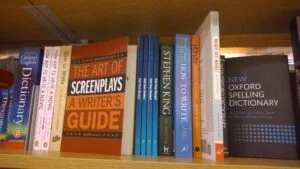To celebrate the UK's Independent Booksellers' Week that launched this weekend, ALLi Author Advice blog editor Debbie Young explains why she thinks bricks-and-mortar bookshops are of value to all indie authors, whether or not they stock your books, even if you don't even publish print books.
Whether I call myself an indie author, an author-publisher, or a self-published author, the buck stops with me: I am responsible for all aspects of my publishing process, from the writing to the selling. I can choose whether or not to try to sell my print books through bricks-and-mortar bookshops, or whether to stick with handselling wherever I can, plus selling online through the usual distribution channels.
Reality Check
I'm a realist, and as I currently write books with a very narrow target audience, I haven't been pursuing the bookshop avenue very much. All I do is to make sure my books are theoretically available to order through bookshops, by giving them my own ISBN and loading them on Ingram Spark. This means they show up on bookshops' ordering systems, so can be ordered for a customer who asks for them. I appreciate that this in itself won't push books through shops, but it will allow them to be pulled.
I've also been lucky enough to secure the support of local bookshops for specific purposes at set times of year: Foyles in Bristol kindly allowed me to launch my diabetes book, free of charge, in their lovely event space on World Diabetes Day last year; three smaller local bookshops near where I live took my Christmas short stories book, one of them placing it in the centre of the shop window; one of them frequently puts me in touch with any contacts that they think might be useful to me. They also recommend ALLi and my book for authors, Sell Your Books!, to any new indie author who approaches them with a view to stocking their book.
The number of books I've actually sold through physical bookshops is tiny. Sometimes they're sold on consignment, requiring me to drive to and from the shop to deliver and collect stocks, thus negating any profit in petrol costs. Even so, I confess to being very excited whenever I spot my books being stocked in a “real” shop.
I can't imagine that this situation is going to change any time soon with regard to my books – not until I write that bestselling novel, anyway!
No Author is an Island
BUT I will still feel diminished if bookshops continue to disappear from our high streets, not only as an individual author, but on behalf of the whole breed of authors. Because doesn't it help us all if bookshops continue to present to shoppers of all ages the notion that buying books is a Good Thing? That instead of spending their disposable income on clothes or shoes or electronics or toiletries, they'd be better to invest in something fabulous to read? That rather than buy birthday and Christmas presents from random shops that they're unsure the recipients would like, that a great book or a book token would be a better solution?
I see bookshops, like libraries and schoolteachers, as ambassadors for the joy of reading – and don't all authors need readers? Unless these players keep shouting the message that reading is cool and fun and an affordable source of joy and inspiration for all ages, our society will all too quickly forget the power of the written word. We'll all be too busy filling our leisure hours with television on demand, listen-again radio and the frenzy that is social media.
Even Helpful to Ebook-Only Authors
Even if I didn't even publish print books, and stuck to ebook only, I'd still want to support physical bookshops – even though by driving shoppers into their stores, I'm showing them the range of competition to my own books. (But hey, they'll be exposed to an awful lot more of the competition if they buy my books online.)
Actually, by supporting my local bookshops, or indeed any other bookshops, such as charity (thrift) stores or the dreaded remainder booksellers, where trade-published books go on reprieve from being pulped, I come away inspired and motivated, as if my creative batteries have had a quick recharge. Visiting bookshops also helps me strengthen my relationship with the stockists that do carry my books.
So really, what's not to love about bricks-and-mortar bookstores? Next time you're on the high street, make sure you visit yours.
This Thursday on the blog we'll be sharing a list of 21 easy ways to support independent booksellers, to benefit the whole author community, so come back then to see which would work best for you.
OVER TO YOU
What is about independent booksellers that you like best? Or if you've been passing them by for a reason, please fire up a debate and tell us why!
How bookshops help all authors, even without stocking their books by @DebbieYoungBN #Authors4Bookstores Share on X








Nothing takes the place of browsing in a bookshop. You can’t smell or touch the books on Amazon. you can’t talk to an enthusiastic bookseller who knows the kind of books you like, but sometimes recommends something quirky which you wouldn’t normally pick up – or be recommended by Amazon. And nothing beats the thrill of seeing your novel face out on Waterstones shelf, like wot I saw a couple of weeks ago with my debut novel, Annie’s Story.
But I admit that some booksellers are still sniffy about s/p books. And I have to admit that although the general standard seems vastly improved from say, 10 years ago, I still come across some horrors, full of typos or badly presented. They’re the ones which give the rest of us a bad name. So let’s all be determined to up our game, pay out for a professional edit, no matter how good we think we are on grammar and spelling. They spot a lot more than that and can make all the difference between being an amateur or a professional.
Thank you. I’ll try to keep this one short. Yes, I’ve seen many independently produced books that are indeed indistinguishable from the traditional publications, and they are very beautiful. But, of course, an equal amount aren’t, embarrassingly so. But perhaps that doesn’t actually matter.
By way of slight digression, do you think that the standard of writing has improved with digital production? With this ease of publication via kindle, say, are writers, would-be writers becoming more meticulous/adventurous in their art? Are the reading public being entertained and edified more these days with the sheer volume of writing available?
And what is self-publication? There are plenty – some less than scrupulous – companies out there, who, for a fee, will advise on a new writer’s work and provide competitions with elusive prizes. They may, also for a fee, plus the client uses the companies ISBNs, publish the new born book. That, I don’t think, is self-publishing; it’s just paying someone else to do the hard work, and forfeiting valuable experience.
There is a bit of an industry going, which preys on the vulnerability of new authors who so desperately want expose for their work. Sadly, in lots of cases it has very little to do with writing and doesn’t advance the writer much. But maybe that doesn’t matter, either.
Oops, there I go again, talk, talk.
Excellent advice, thank you, Brian – and well done!
In 2002, I approached a few bookstores asking them to stock a product; it was mortifying, and I felt pretty diminished by the end of that experience.
Some book shops were supportive; oddly Waterstones said yes, (in fact I had my first book launch in one), but others were rather superior in regard to indie writers. I think they regarded s/p attempts at entering the mainstream as rather fanciful. In those days, the general view was scathing. Even the Arts Council said indie writers were the only ones who thought their work was any good. We’ve come a long way, sort of, but still a little defensive, perhaps?
A separate book shop for independent publishers? I think that by making a distinction between a work that has been endorsed by a publisher – for which you will 7% of very little and no control over its appearance and duration on the shelves – and a work that is produced and managed by its author, is compounding that sense of inequality, like a writers’ apartheid.
A section within a store maybe, if managers feel queasy at the thought of rogue publications sharing space with traditionally published works; after all, it is the mainstream publishers who call the tune.
The irony is, if we were offered a space on the shelf as a ‘proper’ published author, would we take it? And if so, would we want to share it? Or should those pushy self-regarding indies to get their own gig?
Ah, the luxury of choice
Hi Rebecca, and thank you for your long and thoughtful comment. 2002 seems like ancient history in the modern world of self-publishing, and I can well believe that it was not a comfortable experience to be approaching bookshops then.
We have indeed come a long way, both in terms of booksellers’ attitudes to self-publishing, and in general awareness of what it means to be a self-publisher. The technologies available to self-publishers have made it much easier to self-publish professionally, and the wealth of advice available on the internet has made it possible for authors to self-educate quickly and even without cost.
I reckon the only way now is up, in terms of standards and visibility, and that the biggest problem will be the sheer volume of books and authors in the marketplace. That’s one reason that I think we should be doing all we can to grow more leisure readers – hence the importance of supporting bookshops, and any other agency that encourages people of all ages to read for pleasure.
Personally, I don’t think separate bookshops, online or on the high street, for indie authors and self-published books is helpful – in fact, it’s counter-productive – it would indeed feel like writers’ apartheid, and separate shelves within a store would feel like ghettoes to me.
I’m sure those specialist stores (and I only know of them online) that have been founded were set up with the best intentions of supporting the indie sector, but I think they just brand books unnecessarily.
The best self-published books are now indistinguishable from trade-published books, and the average reader doesn’t care how the book is published – all he or she wants is a good book.
But yes, to have choice is a precious thing indeed, and I for one will never seek a trade contract for my books, because I couldn’t bear to lose that independence.
Good work re your book, Lorna! 🙂 You’re right when you highlight how good real-life booksellers are at making recommendations – no matter what other benefits online retailers may offer their search facilities for seeking out book recommendations feel like Stone Age technology, compared to consulting the razor-sharp, highly informed brains of human booksellers!
I love browsing and buying in bookshops. Heaven is deciding to spend €50 on myself and going in to buy about four books. When I really want a book quickly, I order online but can’t beat that browsing. Love how good bookshop owners will recommend good books too.
What I have loved is on a few occasions I have gone into bookshops to enquire if my book is on the shelves (if I don’t see it there) and the bookshop owner has said ‘yes, that is a brilliant book, hang on, we have a couple of copies on the shelves’ and then I admit I’m the authors. Never happens with Easons but has happened a few times with independent shops.